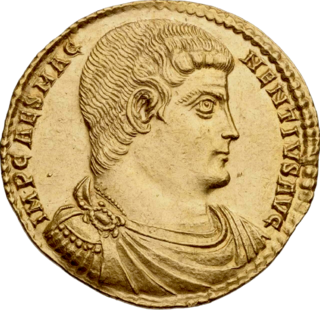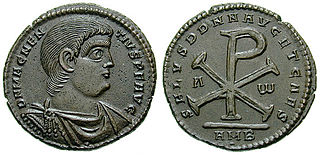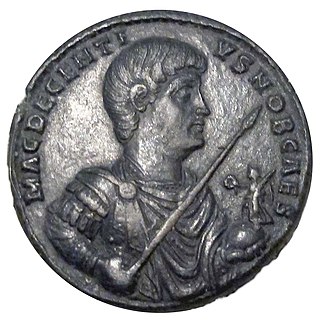Related Research Articles

The Alemanni or Alamanni were a confederation of Germanic tribes on the Upper Rhine River during the first millennium. First mentioned by Cassius Dio in the context of the campaign of Roman emperor Caracalla of 213, the Alemanni captured the Agri Decumates in 260, and later expanded into present-day Alsace and northern Switzerland, leading to the establishment of the Old High German language in those regions, which by the eighth century were collectively referred to as Alamannia.

Constantius II was Roman emperor from 337 to 361. His reign saw constant warfare on the borders against the Sasanian Empire and Germanic peoples, while internally the Roman Empire went through repeated civil wars, court intrigues, and usurpations. His religious policies inflamed domestic conflicts that would continue after his death.

Flavius Julius Constans, also called Constans I, was Roman emperor from 337 to 350. He held the imperial rank of caesar from 333, and was the youngest son of Constantine the Great.

Julian was the Caesar of the West from 355 to 360 and Roman emperor from 361 to 363, as well as a notable philosopher and author in Greek. His rejection of Christianity, and his promotion of Neoplatonic Hellenism in its place, caused him to be remembered as Julian the Apostate in Christian tradition. He is sometimes referred to as Julian the Philosopher.
The 350s decade ran from January 1, 350, to December 31, 359.

Year 357 (CCCLVII) was a common year starting on Wednesday of the Julian calendar. At the time, it was known as the Year of the Consulship of Constantius and Iulianus. The denomination 357 for this year has been used since the early medieval period, when the Anno Domini calendar era became the prevalent method in Europe for naming years.

Valentinian I, sometimes called Valentinian the Great, was Roman emperor from 364 to 375. He ruled the Western half of the empire, while his brother Valens ruled the East. During his reign, he fought successfully against the Alamanni, Quadi, and Sarmatians, strengthening the border fortifications and conducting campaigns across the Rhine and Danube. His general Theodosius defeated a revolt in Africa and the Great Conspiracy, a coordinated assault on Roman Britain by Picts, Scoti, and Saxons. Valentinian founded the Valentinianic dynasty, with his sons Gratian and Valentinian II succeeding him in the western half of the empire.

Magnus Magnentius was a Roman general and usurper against Constantius II. Of Germanic descent, Magnentius served with distinction in Gaul under the emperor Constans. On 18 January 350 Magnentius was acclaimed Augustus. Quickly killing the unpopular Constans, Magnentius gained control over most of the Western Empire. The Eastern emperor Constantius II, the brother of Constans, refused to acknowledge Magnentius' legitimacy and led a successful campaign against Magnentius. Ultimately, Magnentius' forces were scattered after the Battle of Mons Seleucus, and he died by suicide on 10 August 353.

Alamannia, or Alemania, was the kingdom established and inhabited by the Alemanni, a Germanic tribal confederation that had broken through the Roman limes in 213.

This is a chronology of warfare between the Romans and various Germanic peoples. The nature of these wars varied through time between Roman conquest, Germanic uprisings, later Germanic invasions of the Western Roman Empire that started in the late second century BC, and more. The series of conflicts was one factor which led to the ultimate downfall of the Western Roman Empire in particular and ancient Rome in general in 476.

The Battle of Mons Seleucus was fought in 353 between the armies of the Roman emperor Constantius II and the usurper Magnentius. Constantius' forces were victorious. Support for Magnentius had been eroding since his defeat at the Battle of Mursa Major two years prior; after Mons Seleucus his cause collapsed and he killed himself.

The Battle of Lingones was fought in 298 between the Western Roman Empire and the Alamanni. The Roman force was led by Constantius Chlorus, and was victorious.
The Battle of Strasbourg also known as the Battle of Argentoratum was fought in 357 between the Western Roman army under Julian and the Alamanni tribal confederation led by the joint paramount King Chnodomar. The battle took place near Strasbourg, called Argentoratum in Ammianus Marcellinus' account, Argentorate in the Tabula Peutingeriana.

Magnus Decentius was caesar of the Western Roman Empire from 350 to 353, under his brother Magnentius.
Ursicinus was a Roman senior military officer, holding the rank of Magister Equitum per Orientem and even Magister Peditum Praesentalis in the later Roman Empire c. 349–359. He was a citizen of Antioch and was well connected in the Eastern part of the Roman Empire.
The siege of Autun was a conflict fought between the Roman Empire and the invading barbarian Alamanni tribe, who were ravaging Gaul, in 356 AD. The Romans successfully defended the city, and the barbarians retreated on the approach of reinforcements.
Barbatio was a Roman general of the infantry under the command of Constantius II. Previously he was a commander of the household troops under Gallus Caesar, but he arrested Gallus under the instruction of Constantius, thereby ensuring his promotion on the death of Claudius Silvanus. In 359, both he and his wife Assyria were arrested and beheaded for treason against Constantius, possibly as part of a plot by Arbitio, a senior cavalry commander, and another exponent of the forms of scheming and political intrigue that became such a part of the later Roman Empire.

Helena was a Roman Empress by marriage to Julian, Roman emperor in 360–363. She was briefly his Empress consort when Julian was proclaimed Augustus by his troops in 360. She died prior to the resolution of his conflict with Constantius II.
Suomarius was an Alemannic petty king in the 4th century.

Vadomarius was an Alemannic king and Roman general, who shared power with his brother Gundomadus. After instigating an indecisive campaign in Gaul against the Romans, Vadomarius and his brother signed a treaty with the Roman emperor Constantius II in AD 356. Encouraged by Constantius II, Vadomarius employed his Alemanni forces in an attack against Julian. Vadomarius then concluded a treaty with Julian, after which, he unsuccessfully attempted to play the two Roman figures against one another. When Julian was made aware of this, he arrested Vadomarius and banished him to Hispania. His son Vithicabius succeeded him as king. Later, Vadomarius allied himself with Rome under emperors Jovian and Valens, leading his forces against the usurper Procopius and fighting the Persians on Rome's behalf.
References
- Cameron, Averil & Peter Garnsey editors, The Cambridge Ancient History, Volume 13. CUP, Cambridge, 1998. ISBN 0-521-30200-5
- Drinkwater, John F., The Alamanni and Rome 213-496 (Caracalla to Clovis), OUP Oxford 2007. ISBN 0-19-929568-9
- Potter, David S. The Roman Empire at Bay AD180-395, Routledge, New York, 2004, ISBN 0-415-10058-5
- Gibbon, Edward, The Decline And Fall Of The Roman Empire, The Modern Library, New York, 1932.
- Ammianus Marcellinus, The History, Kindle Edition